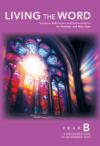Scripture Study for
Fifth Sunday of Lent
Ezekiel 37:12–14 / Psalm 130:7 / Romans 8:8–11 / John 11:1–45 or 11:3–7, 17, 20–27, 33b–45
<< Back to LECTIONARY RESOURCES
Understanding the Word
By Br. John R. Barker, OFM
In Ezekiel’s time, Israel was in exile, estranged from God. Thus in his vision of the “dry bones” (37:1–14), he sees Israel as truly dead. This “death” easily led to despair of eventual reconciliation with God and a return to life. In response to doubts of God’s continued love of them, Israel receives divine assurance that although they are dead now, the time of alienation will come to an end. Israel will be restored to God and to the land. This spiritual rebirth is characterized as resurrection from the grave. God confirms that Israel remains “my people,” and will certainly bring them back to life: “I have promised, and I will do it.”
For Saint Paul, physical and spiritual death are inherently related. Bodily death is ultimately the result of sin—the body is dead because of sin. In Christ, the Spirit of God brings life first by attending to the condition of sin, conquering it and “replacing” it with righteousness, spiritual life. This same Spirit is also able to raise the physical body from the dead, as the Spirit did for Jesus. The Spirit of Christ, belonging to those who have turned away from “the flesh” (a metaphor for all that is in us opposed to the will of God), resurrects us from both spiritual and physical death.
When Jesus hears that his friend Lazarus is ill, he first says that the illness will not end in death. One gets the impression from this that he is not worried that Lazarus will actually die, which would explain his delay of two days before returning to Bethany. Yet Jesus knows in fact that Lazarus has died in that time, and we realize that he has allowed this to happen so that he can “awaken him.” In this final and most dramatic sign, Jesus allows the death of Lazarus so that he can publicly raise him from the dead. Such a feat is intended to provoke belief that he is who he has been claiming to be all along, the One sent by God, who alone has the power to give life.
